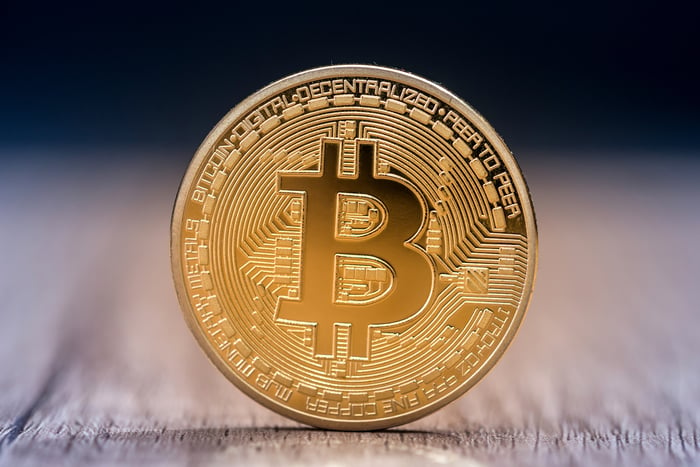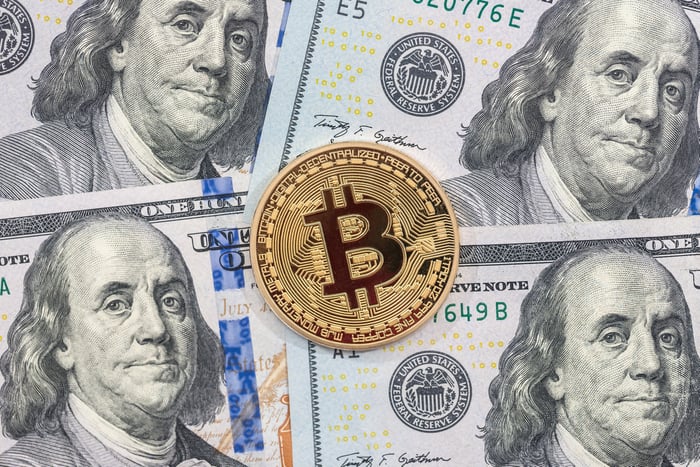Historically, the stock market has gained about 7% annually, inclusive of dividend reinvestment and adjusted for inflation. This suggests that your invested money has an opportunity to double about once every decade. Over a lifetime of investing, you could witness your money double in value perhaps four, five, or six times.
For cryptocurrency investors, that entire lifetime's worth of gains has been realized in less than 11 months. The aggregate value of the more than 1,300 cryptocurrencies that investors can now buy equates to $314 billion as of Nov. 28, up from $17.7 billion at the beginning of the year. That's nearly a 1,675% gain in just under 11 months. In fact, the aggregate market cap for cryptocurrencies has essentially doubled over the past eight weeks.

Image source: Getty Images.
Bitcoin hits $10,000
Leading that charge has been the most popular, and valuable, virtual currency in the world, bitcoin. Bitcoin's market cap recently stood at $166 billion, putting it ahead of Wall Street darlings like General Electric and Walt Disney. More importantly, its price per coin hit an all-important psychological milestone -- at least on some cryptocurrency exchanges -- of $10,000. Since beginning the year at under $967 a coin, bitcoin has rallied more than 930%!
What's behind this powerful rally, you ask? It looks to be a confluence of five catalysts pushing bitcoin higher.
1. Excitement surrounding blockchain
Right now, there's a lot of excitement surrounding blockchain, the digital and decentralized open-source transaction ledger that underlies most virtual currencies, including bitcoin. Blockchain logs all transactions without the need for a financial intermediary, like a bank, and it can do so in a safe and secure manner. Since these networks are open source, altering logged data is practically impossible, making blockchain especially secure and particularly appealing to the financial-services industry.
Four months ago, bitcoin completed an upgrade to its blockchain that improved capacity while reducing settlement times and transaction fees. One of the main reason for this upgrade -- which is why bitcoin forked into two separate virtual currencies -- was the belief by a majority of the bitcoin community that its blockchain should be targeted at bigger businesses. It remains to be seen if bitcoin's blockchain will indeed attract enterprises, but it's clearly exciting investors.

Image source: Getty Images.
2. Weaker U.S. dollar
A second big catalyst for bitcoin has been weakness in the U.S. dollar. A weaker dollar is great news for President Trump considering that it should boost U.S. exports. However, investors holding onto cash aren't so happy to see their cash devalue over time. When the dollar falls, investors usually seek the safety of gold, since it's a finite resource that's been used as a currency for centuries. In other words, the gold that's on this planet now is all that we'll ever have, unless we decide to go mine another planet or asteroid.
But investors have viewed bitcoin as a store of value, too. Bitcoin's protocols limit the number of mined coins to 21 million, meaning it's a "finite" resource, as well. Since it has vastly outperformed gold in 2017, some investors have chosen it over the lustrous yellow metal.
3. Retailer/merchant acceptance
Bitcoin is also benefiting from its growing acceptance as a form of payment. Back in 2014, a number of brand-name businesses began accepting bitcoin as payment. This included Overstock.com (BYON -6.48%), which is arguably leading the cryptocurrency wave among big business. In addition to bitcoin, Overstock also accepts Ethereum, bitcoin cash, Litecoin, Monero, and Dash. Overstock has also been hanging onto a small percentage of its cryptocurrency payments rather than converting them back to U.S. dollars. The reason? It sees upside in cryptocurrency valuations, which is a view that has certainly paid off in 2017.
More recently, payment facilitator Square (SQ -4.53%) jumped aboard the crypto-train. Square is allowing some of its Cash app mobile users to test buying and selling bitcoin with a swipe of their fingers.
Long story short, the more merchants that give bitcoin a shot, the more validity there is to it.

Image source: Getty Images.
4. Regulation and validation
Regulation is a bit of a double-edged sword for cryptocurrencies, as it could keep them out of highly prized markets. For instance, China putting the kibosh on initial coin offerings and domestic cryptocurrency exchanges was briefly worrisome news for bitcoin and its peers in September. But at the same time, Japan began accepting bitcoin as legal tender earlier this year, helping to validate the world's most popular virtual currency.
On top of Japan accepting bitcoin as legal tender, the CME Group (CME -1.56%) recently announced that it would offer bitcoin futures before the end of the year. Futures trading will open the door for institutional investors who'd previously been gun-shy about purchasing virtual currencies on decentralized exchanges. It also helps validate bitcoin as an asset class of its very own.
5. Fear of missing out
Finally, the fear of missing out, which is more popularly known as "FOMO" on financial news networks, has likely been a driving force. Investors young and old, experienced and inexperienced, have a hard time setting aside their emotions and allowing logic to take over when we're seeing 1,000%, 2,000%, and even 10,000% year-to-date gains. Those investors don't want to be left on the sidelines while seemingly everyone else is getting rich.
It's also worth noting that retail investors have predominantly been the driving force behind bitcoin's rally. Most institutional investors have stuck to the sidelines, allowing the more emotional retail investor to drive pricing action.

Image source: Getty Images.
A bubble waiting to burst?
Now the big question is: Will this so-called bubble burst? I'm inclined to believe we will see a major letdown at some point, but I'm not entirely certain when that time will come.
In particular, I have two worries with bitcoin. First, I'm concerned that its blockchain won't be preferred by big business. Remember, there are more than 1,300 other virtual currencies out there to choose from, and the barrier to entry in bringing a new blockchain to market is relatively low. There's little security in bitcoin aside from its size and merchant acceptance, but there's no guarantee that it will last.
The other worry here is that history has shown investors to overestimate the acceptance of new technology. While there's little arguing that blockchain has value and can be a positive for enterprise customers, we've seen only pilot and small-scale projects testing blockchain for the time being. It could take years before we see any meaningful uptake of blockchain technology on a broad platform, but it appears that investors are expecting this acceptance to be immediate.
With emotions as heightened as they are, I don't believe it would take much for bitcoin to significantly retreat at this point.





